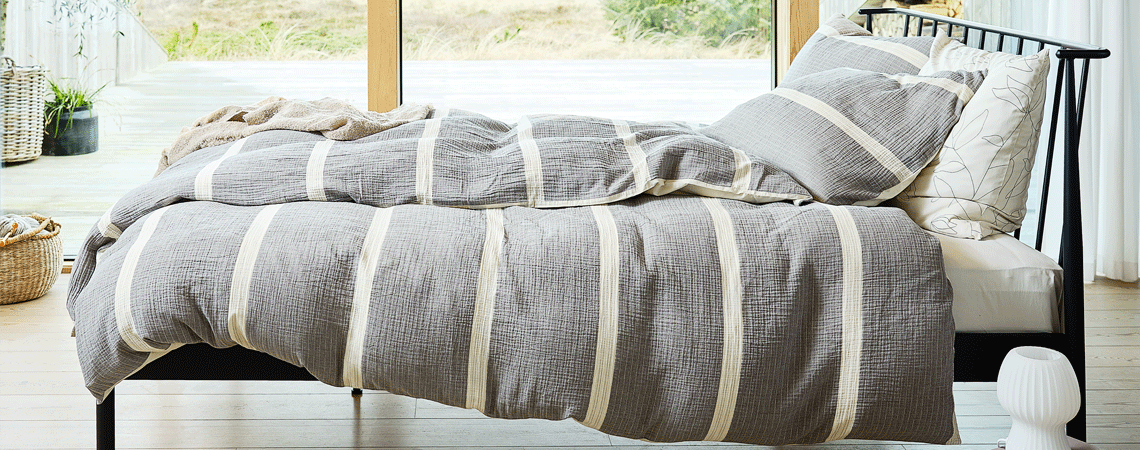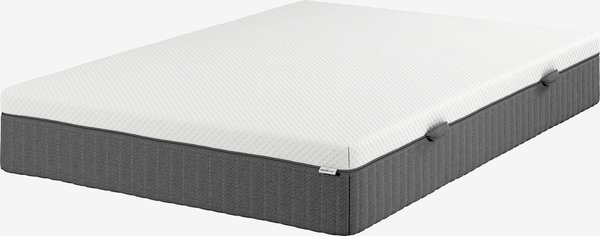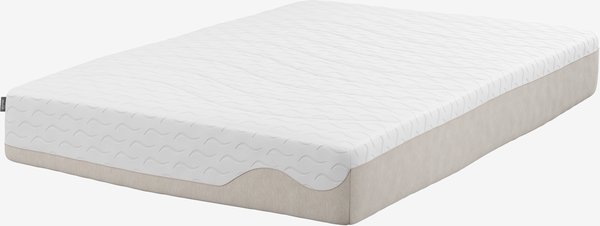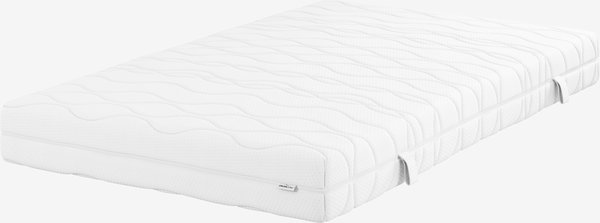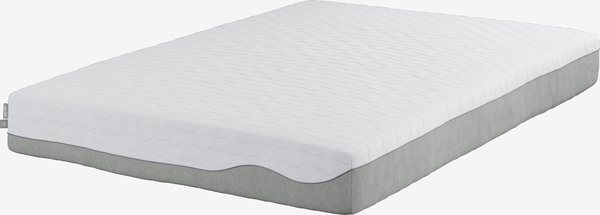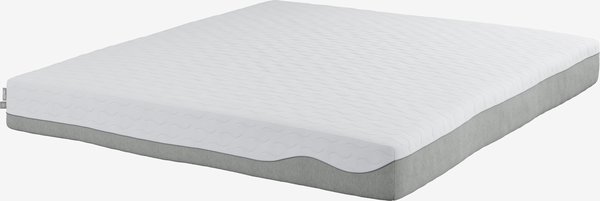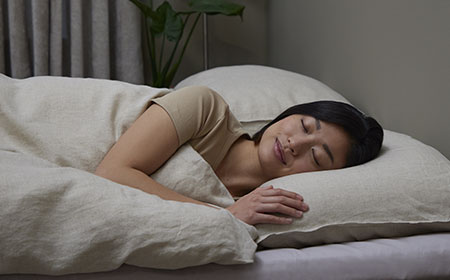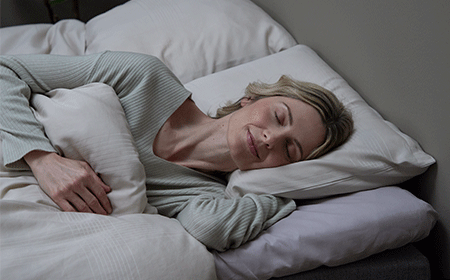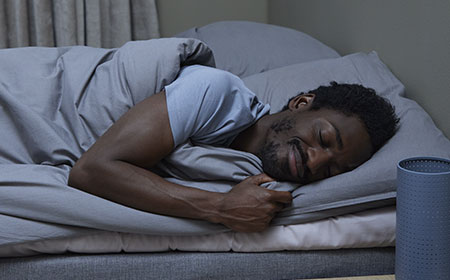When you want to find the best mattress for you, it's less important whether it is a spring mattress or a foam mattress. What's most important is finding a mattress that will give you a good night's sleep so you wake up fully rested and without any soreness.
Your preferred sleeping position is the most important factor to consider when buying a mattress. But there are other factors at play, which we will dive into below:
- Your body type
- Whether you tend to get cold or hot during the night
- Any history of back problems
- Any allergies you may have
Your mattress and sleeping position
Ensuring that your mattress's firmness is a good match for your preferred sleep position is an essential part of getting a good night's sleep. In fact, your sleep position is the first thing you should consider when choosing a mattress.
If you sleep on your side, you want to be able to sink into your mattress at the shoulders and hips. Thus, side sleepers should generally choose a mattress with designated shoulder and hip zones. If you sleep on your back, you should opt for a mattress with a more uniform comfort. A mattress that supports your body will help you maintain an ergonomically correct sleeping position throughout the night.
Your weight determines the firmness of your mattress
Your weight and body shape also help determine how firm your mattress should be. As a rule of thumb, the more you weigh, the firmer your mattress should be. If you have a fuller form, a mattress with support zones at the hips and shoulders is probably the best choice for you.
A mattress with distinct support zones ensures that your shoulders and hips correctly sink into the mattress while keeping your spine straight.
The size of your mattress is also important for a good night's sleep. Do you sleep alone or with a partner? Are you taller than average? These are some of the things to consider when choosing the right mattress size.
If you weigh less than 75 kg, you'll want a medium-firm mattress:
Are you cold or warm during the night?
The ultimate remedy against feeling too hot or too cold in bed is choosing the right duvet, but your mattress choice also plays a significant role.
A mattress with memory foam will keep you warm because you sink further down into it. Conversely, a latex mattress allows the heat to escape.
Whether you feel warm or cold, it's a good idea to invest in a top mattress that can complement your mattress's qualities and give you an even greater cooling or warming effect, depending on your preference.
A mattress for back problems
An effective way to determine whether your mattress gives your body the support it needs is to pay attention to how your back feels in the morning. If you feel more back pain when you wake up than you did when you went to bed, you are likely sleeping on the wrong type of mattress.
If your mattress doesn't have the right firmness and support, it will put unnecessary pressure on your muscles and joints. A too firm or too soft mattress can give you back problems.
If you have back problems, the positioning of your spine is a crucial factor in selecting the right mattress. For a mattress to support you correctly, your spine should be straight when you lie on both your back and your side. To achieve this, the widest points of your body – your hips and shoulders – should sink into the mattress, while the narrowest points – typically your waist – should have enough support to stay on top of the mattress. It's important that your spine doesn't arch or bend, as that places strain on your back.
You can test whether you have found the right mattress for back problems by lying on it on your back. Ask a friend or a partner to place a hand under your lower back. If it's easy to slide the hand under, the mattress is too firm. On a very soft mattress the hand has to be forced and that should also be avoided. If there's an even amount of pressure between your back and the mattress, the mattress has the correct firmness for your body.
While it's always a good idea to get professional help at your local JYSK store when you're buying a mattress, this is particularly important when you have back problems. Sleeping correctly is important. That's why JYSK offers a 100-day trial on mattresses.
"A good mattress can compensate for the back tension that can build up during the night, but it can't solve back problems caused by hard physical work."
– Peter, Category Manager, JYSK
Choose latex if you have dust mite allergy
A mattress with a latex core is a good solution for those who suffer from dust mite allergies. A latex mattress is a foam mattress that contains a combination of natural or synthetic latex and other materials. Latex mattresses have great breathability and, more importantly for allergy sufferers, dust mites cannot live in them.
We recommend supplementing with a mattress pad that can be washed at high temperatures. You should also make sure to frequently air out your bedroom.
Also see our complete guide to mattresses.
If you weigh between 75 and 95 kg, you should choose a firm mattress:
If you weigh more than 95 kg, your mattress should be very firm:
Are you cold or warm during the night?
The ultimate remedy against feeling too hot or too cold in bed is choosing the right duvet, but your mattress choice also plays a significant role.
A mattress with memory foam will keep you warm because you sink further down into it. Conversely, a latex mattress allows the heat to escape.
Whether you feel warm or cold, it's a good idea to invest in a top mattress that can complement your mattress's qualities and give you an even greater cooling or warming effect, depending on your preference.
A mattress for back problems
An effective way to determine whether your mattress gives your body the support it needs is to pay attention to how your back feels in the morning. If you feel more back pain when you wake up than you did when you went to bed, you are likely sleeping on the wrong type of mattress.
If your mattress doesn't have the right firmness and support, it will put unnecessary pressure on your muscles and joints. A too firm or too soft mattress can give you back problems.
If you have back problems, the positioning of your spine is a crucial factor in selecting the right mattress. For a mattress to support you correctly, your spine should be straight when you lie on both your back and your side. To achieve this, the widest points of your body – your hips and shoulders – should sink into the mattress, while the narrowest points – typically your waist – should have enough support to stay on top of the mattress. It's important that your spine doesn't arch or bend, as that places strain on your back.
You can test whether you have found the right mattress for back problems by lying on it on your back. Ask a friend or a partner to place a hand under your lower back. If it's easy to slide the hand under, the mattress is too firm. On a very soft mattress the hand has to be forced and that should also be avoided. If there's an even amount of pressure between your back and the mattress, the mattress has the correct firmness for your body.
While it's always a good idea to get professional help at your local JYSK store when you're buying a mattress, this is particularly important when you have back problems. Sleeping correctly is important. That's why JYSK offers a 100-day trial on our GOLD mattresses.
"A good mattress can compensate for the back tension that can build up during the night, but it can't solve back problems caused by hard physical work."
– Peter, Category Manager, JYSK
Choose latex if you have dust mite allergy
A mattress with latex is a good solution for those who suffer from dust mite allergies. Mattresses with latex typically have great breathability and, more importantly for allergy sufferers, dust mites cannot live in latex.
We recommend supplementing with a mattress pad that can be washed at high temperatures. You should also make sure to frequently air out your bedroom.
Also see our complete guide to mattresses
